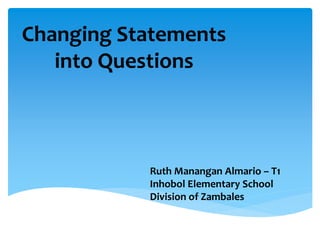
Changing statement into question
- 1. Changing Statements into Questions Ruth Manangan Almario – T1 Inhobol Elementary School Division of Zambales
- 2. Review Can you read each question with proper intonation? 1. Do you know where you’re going to? 2. Did you deliver your report correctly? 3. Can you sing well? 4. Have you ever been to Sorsogon?
- 3. The Ferris Wheel Ride Myrna was scared to ride on the ferris wheel. On fiesta day, her cousin asked her to ride on the ferris wheel. When the ferris wheel turned around, Myrna felt dizzy. She couldn’t look down. She felt as if she was falling.
- 4. Study how each sentence in the selection is changed into a question. 1. Myrna was scared to ride on the ferris wheel. (statement) Was Myrna scared to ride on the ferris wheel? (question) 2. One fiesta day, her cousin asked her to ride on the ferris wheel. (statement) Did her cousin ask her to ride on the ferris wheel one fiesta day? (question)
- 5. 3. When the ferris wheel turned around, Myrna felt dizzy? (statement) Did Myrna feel dizzy when the ferris wheel turned around? (question) 4. She could be the winner. (statement) Could she be the winner? (question) 5. She felt as if she was falling. (statement) Did she feel as if she was falling? (question)
- 6. 1. One way of changing statements into questions is to change the word order. The verb comes first and the subject follows the verb. The students are dismissed. Are the students dismissed? I am confused. Am I confused? How do we change statements to questions?
- 7. Math is difficult. Is Math difficult? The boys were honest. Were the boys honest? 2. Some statements need helping verb does, do and did when changed to questions.
- 8. a. Use does if the verb in the statement is in the present-singular form. Agatha covers her new book. Does Agatha cover her new book? The librarian always assists me. Does the librarian always assist me? b. Use do if the verb in the statement is in the present-plural form.
- 9. The children collect shells every morning. Do the children collect shells every morning? Parents advise their children. Do parents advise their children? c. Use did if the verb use in the statement is in the past-plural/past-singular form. Singular subject Juan plowed the field. Did Juan plow the field?
- 10. Plural subject The visitors enjoyed the refreshments. Did the visitors enjoy the refreshments? Celso and Chester graduated with honors. Did Celso and Chester graduate with honors?
- 11. Change these statements into questions. 1. God is my protector. Is God my protector? 2. Timmy is so inattentive. Is Timmy so inattentive? 3. The flowers are wilting. Are the flowers wilting? 4. The audience was excited. Was the audience excited? 5. The rebels were killed in an encounter. Were the rebels killed in an encounter?
- 12. Change these statements into questions using does, do or did. 1. Jason delivers newspaper. 2. Abe and Leo earn money by drawing cartoons. 3. The school celebrated its foundation day. 4. The train came on time. 5. The teacher showed a good sense of humor.
- 13. 1. Does Jason deliver newspaper? 2. Do Abe and Leo earn money by drawing cartoons? 3. Did the school celebrate its foundation day? 4. Did the train come on time? 5. Did the teacher show a good sense of humor? Are your answers like these?
- 14. Nina made some curtains. Did Nina make some curtains? 1. Ali will go to a fishing village. 2. Boys run faster than girls. 3. Colors are important to us. 4. Elmer drew building plans. 5. Isaac chases Buddy. Read the following statements. Change each into a question. The first one is done for you.
- 15. Change each statement into a question. 1. Julio is an architect. 2. The tournament lasted a week. 3. Mang Tomas plows the field. 4. We can use your car in going to the concert. 5. Children adore candies. Assignment:
